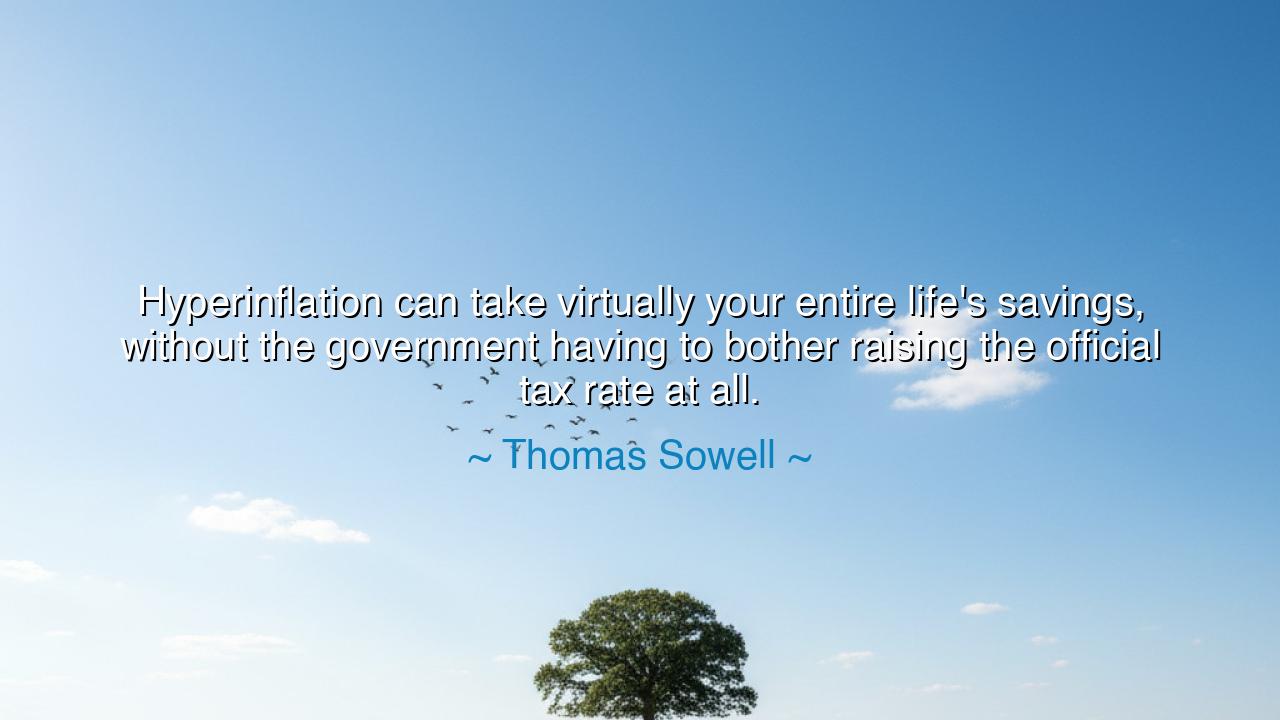
Hyperinflation can take virtually your entire life's savings
Hyperinflation can take virtually your entire life's savings, without the government having to bother raising the official tax rate at all.






The words of Thomas Sowell, one of the great economists and philosophers of our age, strike with the precision of truth and the moral force of warning: “Hyperinflation can take virtually your entire life’s savings, without the government having to bother raising the official tax rate at all.” In this statement, Sowell unmasks a subtle tyranny—one that wears no crown, wields no sword, yet robs a nation in silence. He reveals how inflation, especially when it runs wild, becomes not an accident of economics, but a hidden tax upon the people, devouring the fruit of honest labor while pretending to protect it. His words are not only about money, but about the moral decay that begins when those in power abandon restraint and turn to deception to fund their ambitions.
To grasp the full weight of this quote, one must understand the cunning nature of hyperinflation. It is the quiet thief of nations, the invisible fire that consumes wealth while leaving the illusion of prosperity intact. When a government prints more money than its economy can sustain—whether to cover debts, fund wars, or buy loyalty—it does not immediately raise taxes; instead, it raises prices. The currency itself becomes weaker, and every coin, every bill, every savings account loses its worth. A man may still hold the same number of dollars he once had, but those dollars can no longer buy what they used to. Thus, the state need not demand your gold—it dissolves it through policy. This, Sowell teaches, is the most deceptive form of plunder: one that leaves the people feeling poor, but never quite knowing who to blame.
History, that great teacher of humility, provides countless examples of this truth. The most infamous of them all occurred in Weimar Germany after World War I. Burdened by war reparations and debt, the German government began printing money to pay its bills. At first, it seemed harmless—a small rise in prices, a few more marks in every worker’s hand. But the flood of currency soon drowned the economy. A loaf of bread that once cost one mark came to cost a trillion. People carried wheelbarrows full of money to buy a single meal. Life savings, built over decades of toil, were rendered worthless in months. Children played with stacks of banknotes like toys, while their parents starved. In that chaos, the middle class—the moral backbone of society—was destroyed, and out of the ashes rose tyranny. Hyperinflation had accomplished what taxation and conquest could not: it broke the spirit of a nation.
Sowell’s words carry the same warning for modern times. He understood that governments, when cornered by debt or greed, often choose the path of monetary manipulation over honesty. Instead of telling the people, “We will take more from you,” they quietly expand the money supply, letting inflation do their work. They call it “stimulus,” “quantitative easing,” or “economic relief,” but behind the rhetoric lies the same ancient sin—covetousness disguised as compassion. And when prices rise, the leaders feign surprise, claiming it is the fault of markets, corporations, or foreign wars. In truth, it is the state itself that has debased the coin of the realm. As Sowell reminds us, this is taxation without legislation, theft without confession.
There is a profound moral principle beneath his economic insight: that prosperity cannot be built on deception. When governments manipulate currency, they erode trust—the sacred bond that binds citizen and state. Money, after all, is not just paper; it is a promise. When that promise is betrayed, society itself begins to unravel. The worker loses faith in effort, the merchant loses faith in trade, and the people lose faith in justice. A civilization that cannot trust its money cannot trust its rulers—and without trust, freedom withers. This is why Sowell, though an economist, speaks with the tone of a prophet: because inflation, at its root, is not just an economic failure, but a moral one.
Consider another example, closer to our time: Zimbabwe, in the early 2000s. The government printed money to pay its bills, claiming it would bring prosperity to the poor. Instead, prices rose so fast that wages became meaningless. A trillion-dollar note could not buy a single egg. The people carried stacks of currency that were lighter than their despair. What was once a fertile, thriving nation became a wasteland of hunger and barter. The government had not raised taxes, yet it had stolen everything—their wealth, their dignity, and their future. Such is the power of inflation unrestrained; such is the fate of those who forget that wealth cannot be created by decree.
The lesson of Sowell’s words, therefore, is both economic and eternal: true wealth is born of honesty, discipline, and restraint. Governments, like individuals, must live within their means. When they refuse, the cost is paid by those least able to bear it—the workers, the savers, the families who trusted that their efforts would matter. Every generation must be vigilant, for the enemies of liberty do not always wear uniforms; sometimes they wear smiles and call themselves benefactors. Inflation is the quiet despot of the modern age, and its power grows in the silence of the complacent.
So let the wisdom of Thomas Sowell be remembered: freedom requires fiscal virtue. Demand honesty in money, transparency in policy, and restraint in power. Do not be deceived by promises of endless prosperity without cost. The laws of economics, like the laws of nature, cannot be defied without consequence. A nation that inflates its way out of responsibility may buy time, but it will sell its soul. Guard your savings, guard your labor, and above all, guard the truth—for when money loses its value, so too does the meaning of work, of justice, and of liberty itself.






AAdministratorAdministrator
Welcome, honored guests. Please leave a comment, we will respond soon